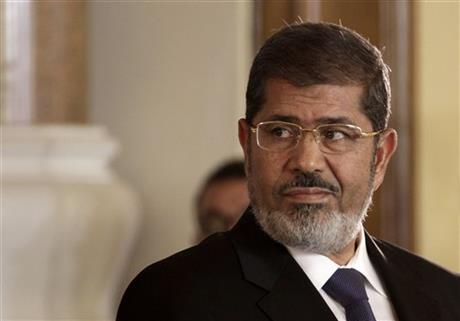
By SARAH EL DEEB
FILE – In this Friday, July 13, 2012 file photo, Egyptian President Mohammed Morsi holds a joint news conference with Tunisian President Moncef Marzouki at the Presidential palace in Cairo, Egypt. Egyptian authorities switched the venue for the trial of the former Islamist president on Sunday, Nov. 3, 2013 a last-minute change made after the Muslim Brotherhood called for mass demonstrations at the original location. The trial of Morsi, now to be held east of the capital on Monday, could lead to another round of bloodshed as his supporters look likely to face an emboldened security apparatus that has boosted its forces for the hearing. (AP Photo/Maya Alleruzzo, File)
CAIRO (AP) — After four months in secret detention, Egypt’s deposed Islamist president defiantly rejected a court’s authority to try him Monday, saying he was the country’s “legitimate” leader and those that overthrew him should face charges instead. The trial was then adjourned until Jan. 8 after several interruptions.
Morsi, Egypt’s first freely elected president, had been held at an undisclosed location since the military ousted him in a coup on July 3.
Looking healthy, Morsi appeared in court wearing a dark blue suit, but no tie. He had refused to wear a prison uniform as the judge had ordered, according to security officials.
Morsi and 14 co-defendants, prominent figures from his Muslim Brotherhood, face charges of inciting the killing of protesters who massed outside the presidential palace in December, demanding he call off a referendum on a new constitution drafted by his Islamist allies. Brotherhood members attacked a sit-in by the protesters, sparking clashes that left 10 people dead. If convicted, Morsi and the 14 other defendants could face the death penalty.
The longtime Brotherhood leader rejected the proceedings and said he had been forced to attend.
“This is a military coup whose leaders must be put on trial in accordance with the constitution,” Morsi told the court.
“I am the president of the republic and I am here against my will,” he said. “What is happening here is providing cover for the military coup,” he said, as his co-defendants chanted “down, down with military coup.”
Monday’s raucous session reflected the highly charged atmosphere of a nation deeply polarized between Morsi’s Islamist supporters, and the military-backed administration and moderate Egyptians who support it.
The judge, Ahmed Sabry Youssef, had to adjourn the hearing twice because the chants disrupted the proceedings. The announcement that the trial will resume Jan. 8 was announced by the court’s secretary.
After Morsi’s statement, the trial was adjourned until Jan. 8 to allow defense lawyers to review documents. Defense lawyers said the judge has ruled that they have access to their clients in prison.
The military says it removed Morsi only after the public turned against him with protests by millions demanding his removal, accusing him and the Brotherhood of trying to subvert the law and impose their will on the country. Morsi’s supporters accuse the military of crushing Egypt’s nascent democracy by overturning the results of multiple elections won by the Islamists since the ouster in 2011 of autocrat Hosni Mubarak in a popular uprising.
Rights advocates have expressed concern about the fairness of the trial as it is taking place in the atmosphere of a widescale crackdown on the Brotherhood and its Islamist allies in which several thousand have been arrested and hundreds killed. The judicial system also is stacked with Morsi’s adversaries, with whom he clashed repeatedly during his year-long presidency.
In a last-minute change, authorities on Sunday switched the trial’s venue in a move apparently aimed at thwarting mass rallies planned by Morsi’s Brotherhood.
Security was tight around the police academy, with hundreds of black-clad riot police backed by armored vehicles deployed around the sprawling complex. Police helicopters hovered over the site. The final stretch of road leading to the academy was sealed off, with only authorized personnel and accredited journalists allowed to approach the facility.
The academy also being used for the re-trial of Mubarak, charged with failing to stop the killing of some 900 protesters during the 18-day uprising that toppled his 29-year regime.
Several hundred Morsi supporters rallied outside the police academy, carrying posters with his photo and banners depicting an open palm with four fingers — the symbol commemorating a pro-Morsi sit-in that was violently cleared by security forces in August. They also chanted slogans against Gen. Abdel-Fattah el-Sissi, the military chief who led the July coup.
Police fired in the air to separate them from Morsi’s opponents. They used tear gas to end clashes between the two sides outside a major court complex in Cairo’s downtown area. Police also used tear gas to disperse thousands of Morsi supporters in the southern city of Assiut.
___
Associated Press writers Maggie Michael, Tony G. Gabriel and Mariam Rizk contributed to this report.



